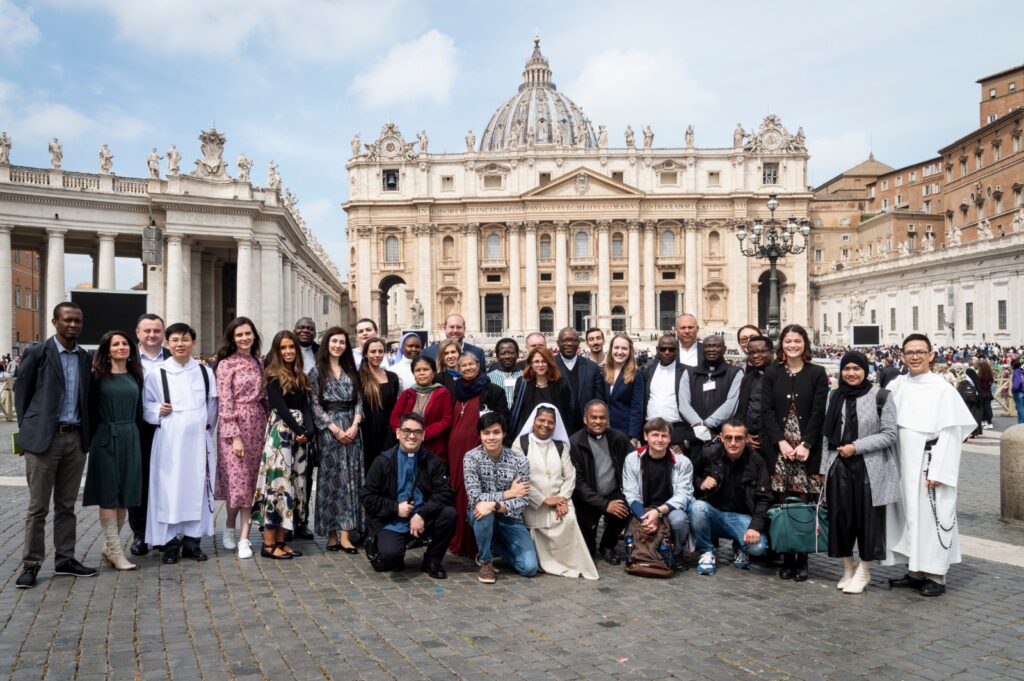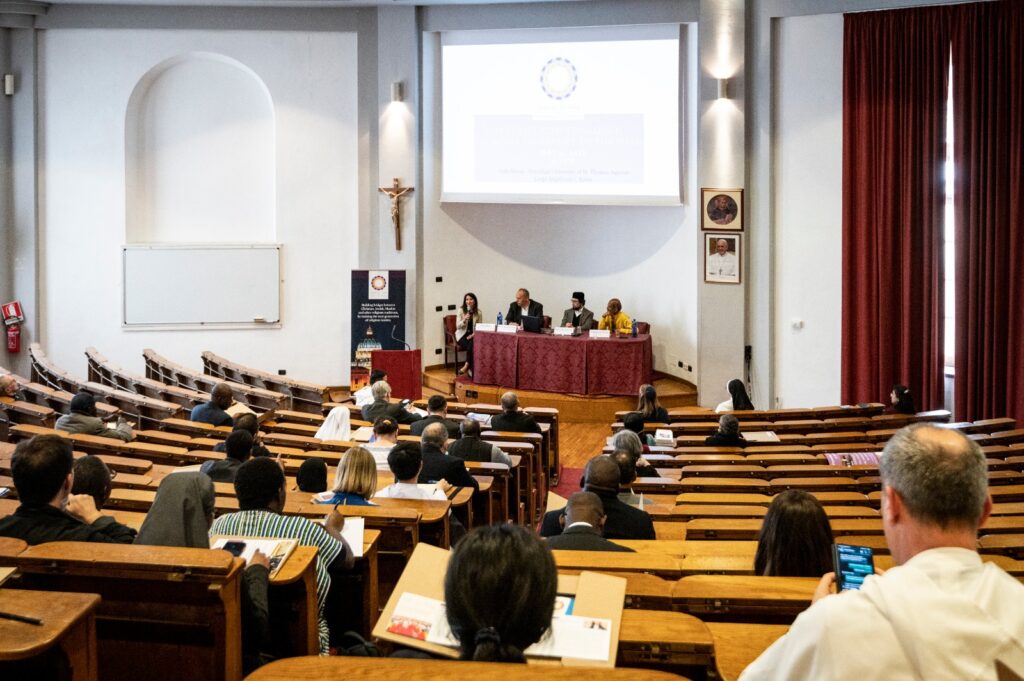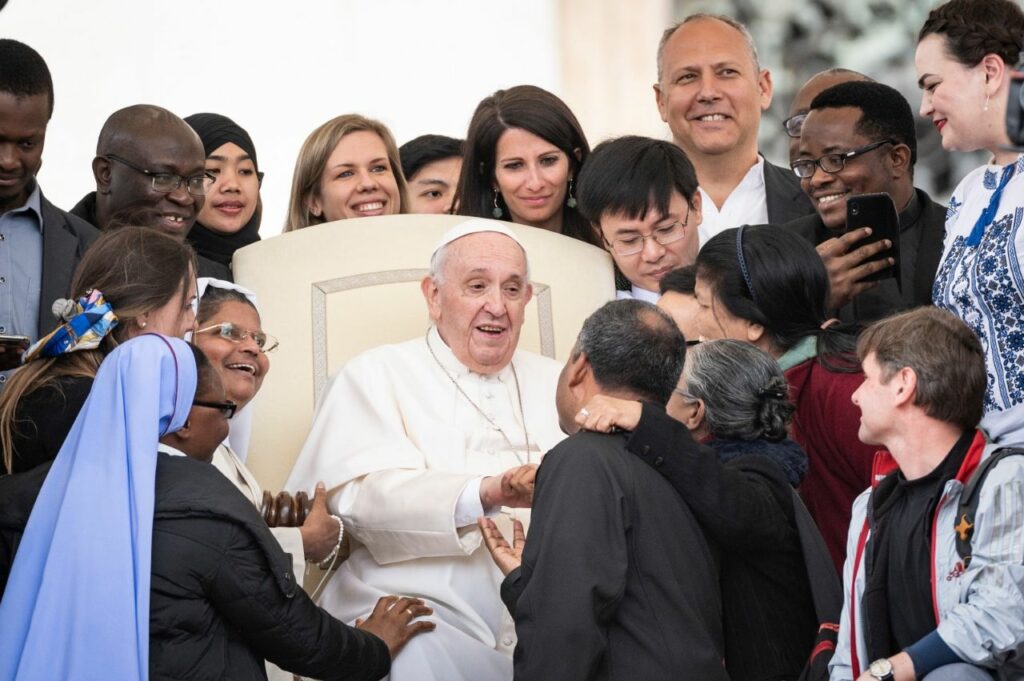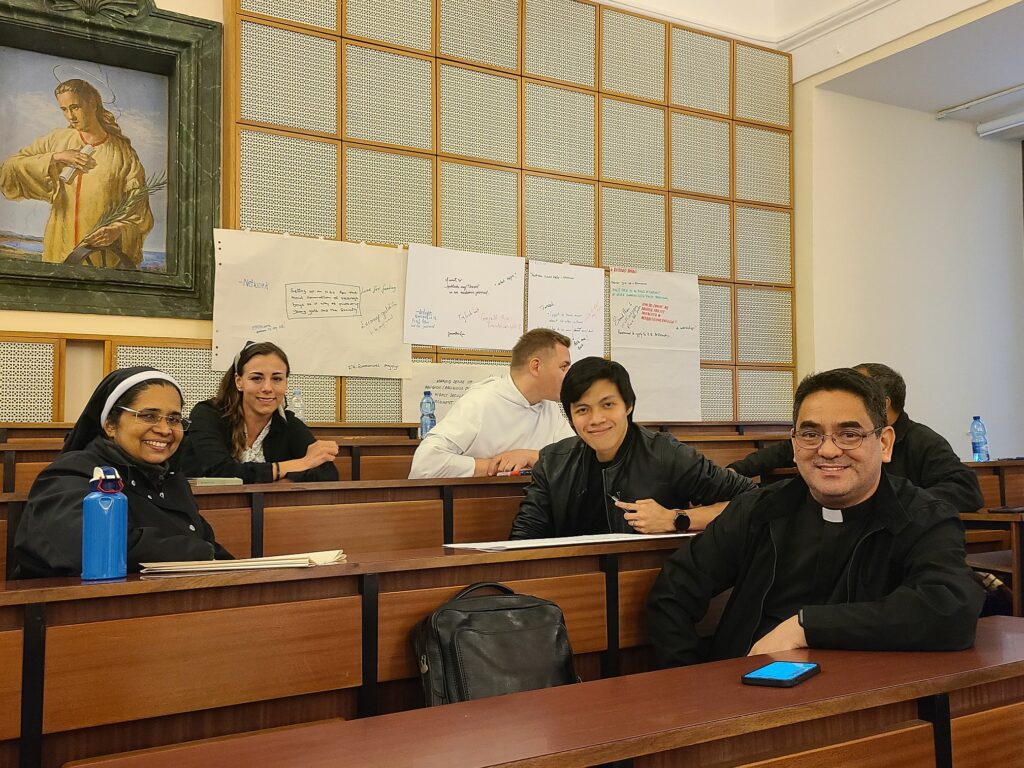Organized by the John Paul II Center for Interreligious Dialogue, this event brought together Russell Berrie Fellows, JPII Leaders, and local partners in Rome to delve deeper into interreligious dialogue through a reflection on the practice of dialogue today by participants with a strong academic and theological foundation.

The John Paul II Center for Interreligious Dialogue was honored to host a large-scale interreligious event during the special visit of many of the JPII Leaders – alumni of the Russell Berrie Fellowship at the Angelicum – who gathered in Rome for some days of networking, workshops, and interfaith engagement. In numbers, thirty nine interfaith leaders from four continents and 19 countries (Albania, Bangladesh, Canada, Georgia, Ghana, India, Indonesia, Ireland, Italy, Nigeria, Philippines, Poland, Romania, Sri Lanka, UK, Ukraine, USA, Vietnam, and Zimbabwe) met to discuss the role of interreligious dialogue in academia and learn about each other’s experience in the field from all around the world.
The event was rich in public lectures open for everyone interested in dialogue, closed workshops created for the JPII Leaders, and informal sessions and discussions. One of the main highlights of these days was a public in-person event at the Angelicum – “Interreligious Dialogue: From the University to the Field.” The first session united prominent scholars of the three Abrahamic traditions: Judaism (Professor Adam Afterman, JPII Center; Tel Aviv University), Christianity (Professor Gavin D’Costa, University of Bristol), and Islam (Imam Yahya Pallavicini, COREIS), who discussed the grounds and best approaches to teach and study interreligious dialogue at the university level in today’s world. The round table was welcomed by Sr. Catherine Joseph Droste, Dean of the Faculty of Theology at the Angelicum, and moderated by Elena Dini, Senior Program Manager of the JPII Center.
The next session gathered four JPII Leaders from four continents: Nataliia Pavlyk (Ukraine), Fr. Gokum Richard (Nigeria), Allyson Zacharoff (USA), and Sr. Pascalina Purobi (Bangladesh) who shared their experience in applying academic education to practical interfaith dialogue initiatives. The speakers shared with great inspiration how academic reflection supports implementation and fostering of dialogue projects in their countries. Professor Gavin D’Costa admitted, “Listening to how the Berrie Fellows had opened new doors in interfaith dialogue with such creativity and insight was inspiring. Each had made very specific interventions with a real understanding of ways of building bridges without eradicating difference.”

Furthermore, the JPII Leaders had the opportunity to meet Msgr. Indunil J. K. Koduthuwakku and Fr. Markus Solo Kewuta at the Pontifical Council for Interreligious Dialogue. They discussed the current challenges and perspectives of interfaith relations in the world. Emily Judd from the USA says, “I left the event with new perspectives on global interfaith dialogue, new connections within the JPII Leaders network, and a renewed personal responsibility to promote interreligious relations. Being surrounded by the other alumni – brilliant and dynamic leaders committed to humanitarian and multifaith efforts – I felt a sense of a greater purpose that we all are advancing together in our own ways.”
Undoubtedly, the culmination moment of the May Event was the Papal Audience at the Vatican and meeting Pope Francis in person. JPII Leaders received the apostolic blessing of the Holy Father for their interreligious work. Sr. Vimal from India mentions with excitement, “The chance to meet His Holiness personally made a lasting spiritual impact on me.” Nataliia Pavlyk from Ukraine adds: “Overflown with happiness and spiritual joy after shaking the hand of Pope Francis, I felt the necessity to share love with the whole creation!” Rabbi Allyson Zacharoff also admits, “My favorite moment was when I asked the Pope if I could pray briefly, and he closed his eyes and lowered his head, and I recited the shehecheyanu, a Jewish prayer for special moments. I felt he showed me great honor in that moment by respecting me and my prayer. I was very impressed that he could meet so many people that day, and yet still have such a personal interaction.”

In the next days, participants were invited to take part in the workshop on antisemitism and countering hate speech with Melissa Sonnino, Facing Facts Coordinator at A Jewish Contribution to an Inclusive Europe – CEJI. The Russell Berrie Fellows and JPII Leaders learned and reflected on the concept of hate speech and its conceptual differences (legal/illegal/harmful); understood how old myths and conspiracy theories about Jews were recycled today; and worked on the possible actions to overcome antisemitic hate speech in their sphere of influence. Fr. Mak Caesar Abagna from Ghana pointed out, “It is the absolute joy of knowing that other people, though totally different from you on two essential things, language and religion, share your vision and dreams. We have something in common, which is dialogue as the way to peace.”
Many of the JPII Leaders presented their vision of dialogue and interfaith engagement during workshops they offered to a diverse audience. Sr. Gracy Joseph Vadakara from India and Gianluca Avanzato from the USA spoke about living interreligious dialogue in today’s world taking insights from the living Catholic tradition. Fr. Michael Ufok Udoekpo (Nigeria), Fr. Mak Caesar Abagna (Ghana), and McKenzie Flowers Fergus (USA) offered practical examples of interreligious relations from the Ghanian and Nigerian contexts. McKenzie shares, “The Russell Berrie Fellows and I took a journey across the theological divide to gain an understanding of interreligious dialogue. Our conception of religious studies particularly presented many valuable insights. The leaders cultivated their skills by learning to face hate speech, upholding tolerance, as well as promoting peace building, among other things.”

Emily Judd and Peter Dziedzic from the USA presented a workshop “From the Grassroots to Institutions: Experiences and Tips in the Field of Christian-Muslim Dialogue” to PISAI students, by sharing their experience of scholarly and practical encountering the Arab world. Presenting his genuine opinion on the May Event, Fr. Humphrey Udechukwu from Nigeria stresses, “It offered me an opportunity to appreciate our common humanity as I saw people from different religious backgrounds engage in an admirable koinonia. The world can only be a better place when we love ourselves as children of God, irrespective of our religious affiliations.”
Besides academic meetings and non-formal sessions, the JPII Leaders took time for leisure and spiritual activities. For instance, they visited Villa Borghese, a worldwide famous art museum in Rome with exceptional masterpieces. Also, they participated in the Holy Mass at St. Peter’s Basilica celebrated by Fr. Norbert Lis, a Russell Berrie Fellow from Poland, and co-celebrated by other JPII Leaders
Speaking of the May Event, Fr. Richard Babao indicates, “The event made me realize that now I have a family in Rome. The inspiration and passion to do interfaith work was truly strengthened, and it fueled me to do more activities back in the Philippines.” Bogdana Katarzhuk from Ukraine shares this vision by saying, “Without exaggeration, the alumni meeting warmed me up. When I returned from Ukraine a few days before the May event, I honestly did not know how I would feel when I got back into a peaceful academic environment after the atrocities of the war I had faced in my homeland. But meeting my colleagues from around the world and listening to the impressive cases of interreligious work was a true healing to my soul.”
Finally, Peter Dziedzic summarizes his experience in Rome, “This gathering offered a humbling and exciting opportunity to draw on the collective energy, insights, and experiences of over ten years of Russell Berrie alumni. For me, the most fulfilling element of our time together was reconnecting with old friends in the program while meeting new alumni with similar interests and goals, all while brainstorming for future projects and initiatives in interreligious dialogue. As we begin to pivot towards more fully developing the JPII Leadership Network, I look forward to what the next ten years bring.”
